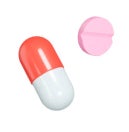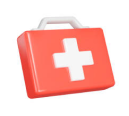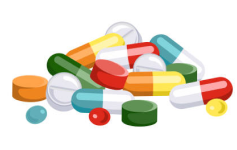Uses
What is Allopurinol for?
Allopurinol is used to prevent gout, a condition that can cause pain and swelling in the joints.
Gout happens when there is too much uric acid in the blood. Uric acid is a chemical that is produced when the body breaks down certain food. Allopurinol reduces the production of uric acid, thus lowering the uric acid levels in the body.
Allopurinol is also used in the treatment of uric acid stones and to prevent uric acid levels from going up too high during chemotherapy.
You can also find out about this medication by watching these videos:
They are available in English, 中文, Melayu and தமிழ்: Allopurinol
How should I take or use Allopurinol?
- Do not stop taking your medication without checking with your healthcare professional.
- This medication should be taken with or after food to reduce stomach upset.
- Take this medication with plenty of water.
What should I do if I forget to take or use Allopurinol?
If you forget to take a dose, take it as soon as you remember. Then take your next dose at the usual time. Do not take two doses to make up for the missed dose.
Precaution
What precautions should I take when taking or using Allopurinol?
Inform your healthcare professional if:
- You are allergic to this medication or any of the other ingredients of this medication
- You have history of kidney condition
- You are pregnant, planning to become pregnant, or breastfeeding
- You are taking any other medications, including supplements, traditional medications and herbal remedies.
It may take a few weeks before you get the full benefits from taking this medication.
Drink enough water (2-3 litres of water a day) unless your doctor has advised you to restrict fluid intake.
Follow the diet plan recommended by your doctor or dietician.
What food or medication should I avoid when I take or use Allopurinol?
Inform your doctor if you are taking:
- Warfarin
- Azathioprine
- Mercaptopurine
Side Effects
What are some common side effects of Allopurinol?
- Diarrhea
- Upset stomach
- Take this medication with or after food to reduce stomach upset
When allopurinol is started for gout prevention, the chances of having gout attacks may be higher initially. Do not stop taking this medication without checking with your doctor. Your doctor may prescribe another medication to be taken together to reduce the risk of getting gout attacks during the initial period of this medication.
What are some rare but serious side effects that I need to seek medical advice immediately?
The symptoms of a drug allergy include one or more of the following:
- Swollen face/eyes/lips/tongue
- Difficulty in breathing
- Itchy skin rashes over your whole body
You can also find out about drug allergies by watching these videos:
They are available in English, 中文, Melayu and தமிழ்: Drug Allergies
Allopurinol is generally safe, but very rarely, a bad skin reaction known as Stevens-Johnson syndrome (SJS), Toxic epidermal necrolysis (TENs) or Drug reaction with eosinophilia and systematic symptoms (DRESS) may happen. This can cause serious health problems that may sometimes be fatal. Your doctor may conduct a gene testing before starting this medication as individuals with a specific gene type (HLA-B*5801) or poor kidney function may be more likely to suffer serious skin reactions.
Stop this medication and see a doctor immediately if you have the following signs within three months of starting this medication. These symptoms may occur separately and may not occur all at the same time:
- Painful rash which can spread to a bigger area and start to blister
- Fever
- Sore throat
- Mouth ulcers
- Swelling of the lymph nodes
- Flu-like symptoms
In rare instances, this medication may also cause injury to the liver. Stop this medication and see a doctor immediately if you notice any dark-coloured urine, light coloured stools, yellowing of the skin or eyes.
For more information on the safe use of Allopurinol, you may refer to the health science authority (HSA) consumer guide: Safe use of allopurinol (gout medicine) (hsa.gov.sg)
Handling
How should I store Allopurinol?
Store in a cool and dry place, away from direct sunlight. Keep this medication away from children.
How do I throw away Allopurinol safely?
Pack this medication into a black trash bag and seal it tightly before throwing into the rubbish chute or bin.
Disclaimers
Please take note that the above is not a complete list of all possible side-effects. If you have any concerns about your medication or if you have other side-effects that you think are caused by this medication, please consult your doctor or pharmacist. If you take more than the recommended dose, please seek medical advice immediately. The information provided on this page does not replace information from your healthcare professional. Please consult your healthcare professional for more information.
This article is jointly developed by members of the National Medication Information workgroup. The workgroup consists of cluster partners (NHG Health, National University Health System and SingHealth), community pharmacies (Guardian, Unity and Watsons) and Pharmaceutical Society of Singapore. The content does not reflect drug availability and supply information in pharmacies and healthcare institutions. You are advised to check with the respective institutions for such information.

Need More Medicine?
Use Medicine Order Service on HealthBuddy.

Medicines Reminder
Get reminders and chart progress on HealthBuddy.
Related Conditions or Treatments

















